Key takeaways:
- Reparations involve acknowledging historical injustices and can take various forms, including financial compensation, land restitution, and formal apologies.
- The UK’s colonial past heavily influences the contemporary conversation on reparations, highlighting the need for society to confront its history to foster healing.
- Arguments for reparations emphasize justice, recognition of harm, and the potential for social cohesion, while counterarguments focus on personal responsibility, practical feasibility, and the risk of division.
- Meaningful reparations require comprehensive dialogue, improved education on historical injustices, and community empowerment initiatives rather than solely financial compensation.
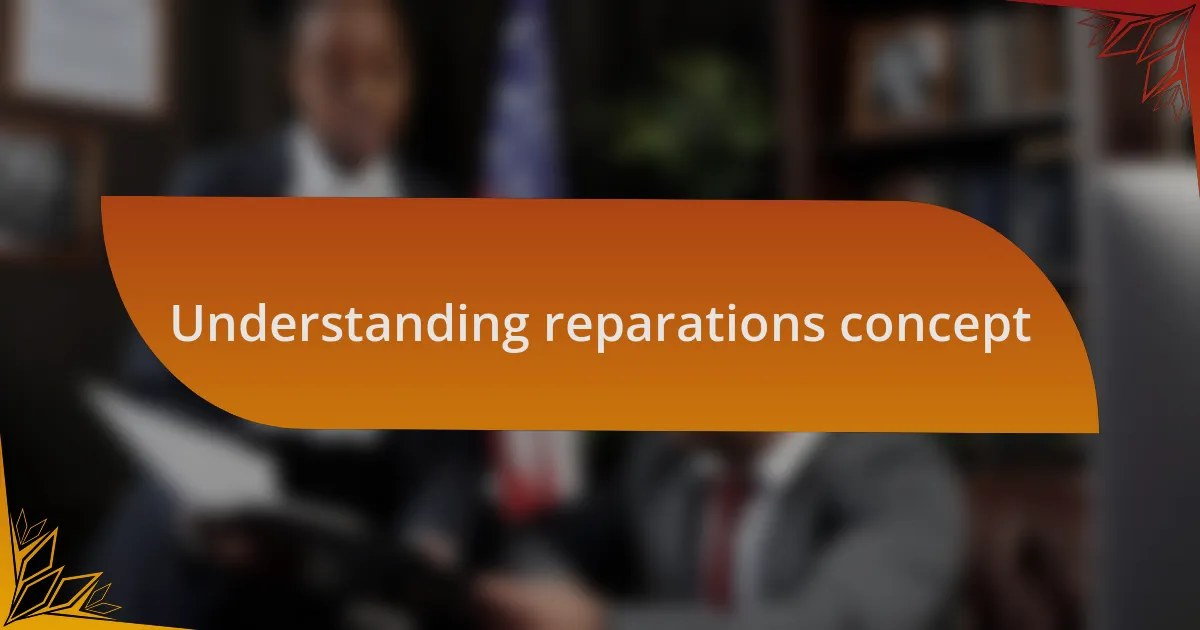
Understanding reparations concept
Reparations, at its core, is about acknowledging historical injustices and providing compensation to those wronged. I often find myself reflecting on how this concept resonates with me personally; do we not all crave recognition for our pain? It’s a complicated emotional landscape where the call for reparations invites us to confront uncomfortable truths about our shared history.
One aspect I find particularly compelling is the idea that reparations can take various forms—financial compensation, land restitution, or even formal apologies. Each type carries its weight, and it makes me wonder, which form resonates most with those who suffered? The conversations often remind me of the many stories I’ve heard from elders in my community, illuminating how reparations can act as a bridge to healing and understanding.
Furthermore, the complexities surrounding reparations also highlight that it’s not just about monetary value, but also about restoring dignity. I recall a discussion with a friend who shared her experience of feeling invisible in the eyes of society; how would a genuine acknowledgment of her ancestors’ struggles change that? It’s these kinds of reflections that deepen my understanding of why engaging with the concept of reparations is so deeply vital for us all, both emotionally and socially.
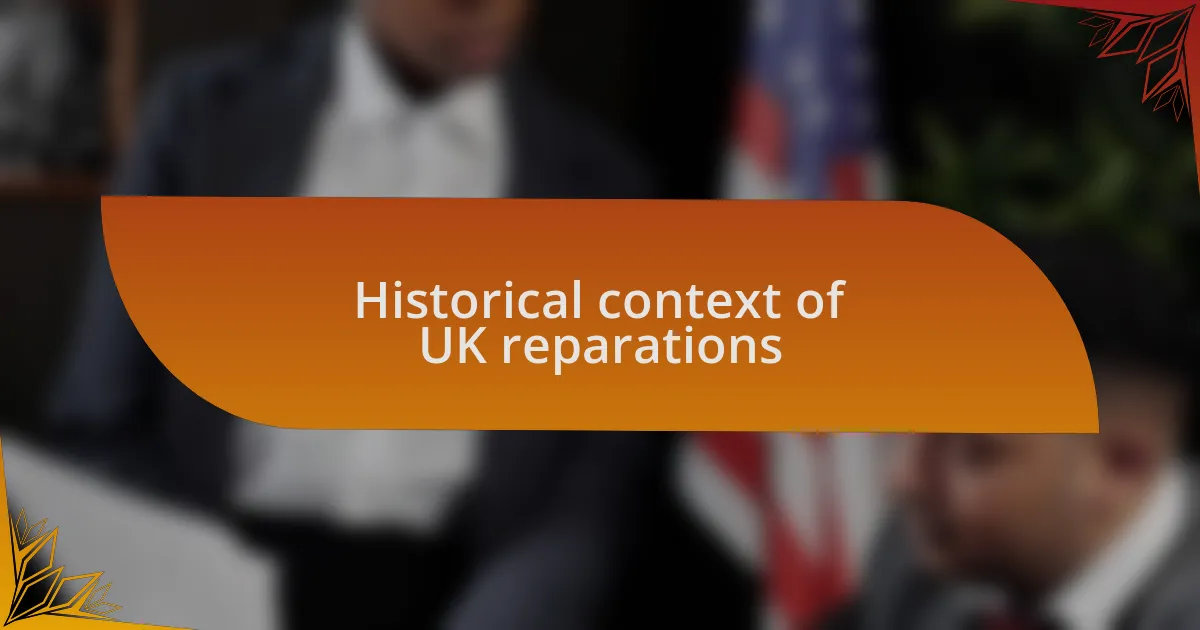
Historical context of UK reparations
The historical context of reparations in the UK is deeply intertwined with its colonial past. For many, the legacy of colonialism reflects a painful chapter that has been largely unacknowledged. I recall reading stories about how the British Empire profited from oppressive systems, leading me to wonder: how can a society move forward without addressing these truths?
When we look at the transatlantic slave trade, the economic benefits accrued during that time still echo today. The discussion often brings to mind my own family history; realizing how colonialism impacted generations fuels my passion for justice. It prompts me to question whether society can truly heal if it continues to overlook the injustices that shaped it.
In the 21st century, calls for reparations have gained momentum, particularly from those who feel the aftermath of these historical injustices. I often think about the power of a well-informed dialogue. How can we expect change if we don’t collectively acknowledge our history? Engaging in these conversations can be a step toward healing, reminding us that understanding our past is crucial for shaping a better future.
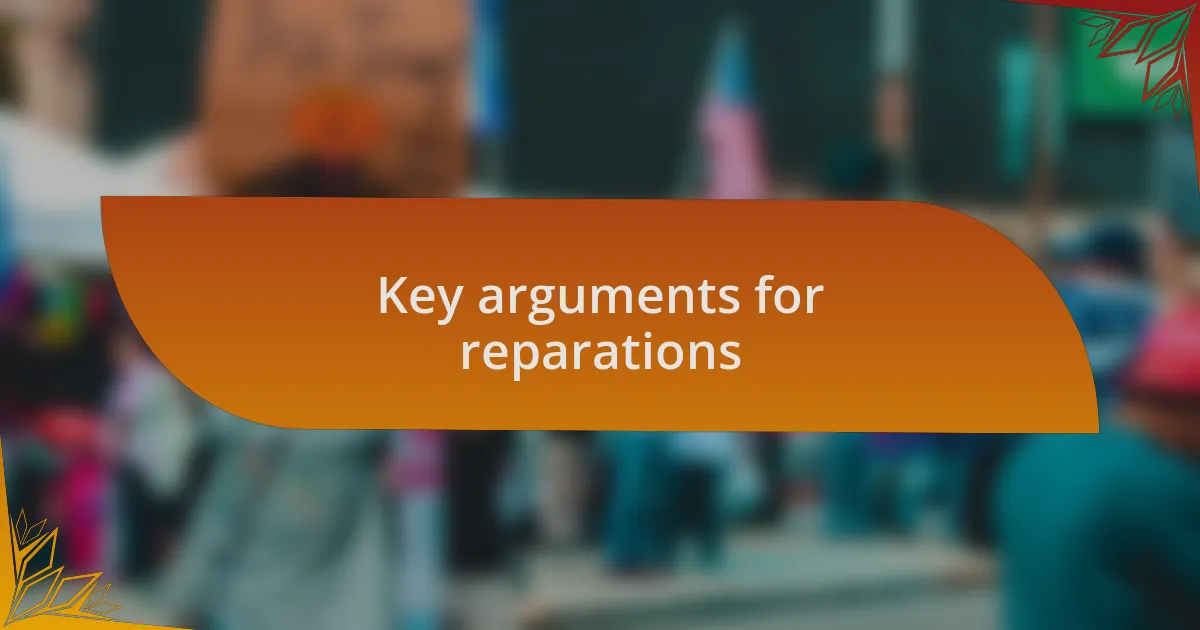
Key arguments for reparations
One of the key arguments for reparations centers on the principle of justice. I often find myself reflecting on the idea of fairness; if one group has disproportionately benefited from the exploitation of another, doesn’t it make sense to address that imbalance? This perspective posits that reparations are not merely compensatory but also restorative, aiming to mend a societal fabric frayed by historical injustices.
Another compelling argument involves the recognition of harm and the acknowledgment of its ongoing effects. I think about how intergenerational trauma plays a significant role in shaping communities today; the scars of past injustices affect mental health, economic opportunities, and social mobility. Acknowledging this harm through reparations can serve as a powerful step towards healing and reconciliation, paving the way for a more equitable society.
Lastly, many advocate for reparations as a means of fostering social cohesion. In my conversations with friends and family, I’ve noticed that these discussions can evoke strong emotions, often requiring vulnerability and openness. Isn’t it worth considering that reparations might help bridge divides, creating a shared understanding and motivating collective efforts towards change? In my experience, facing uncomfortable truths can ultimately strengthen community bonds and inspire a unified push for a better future.
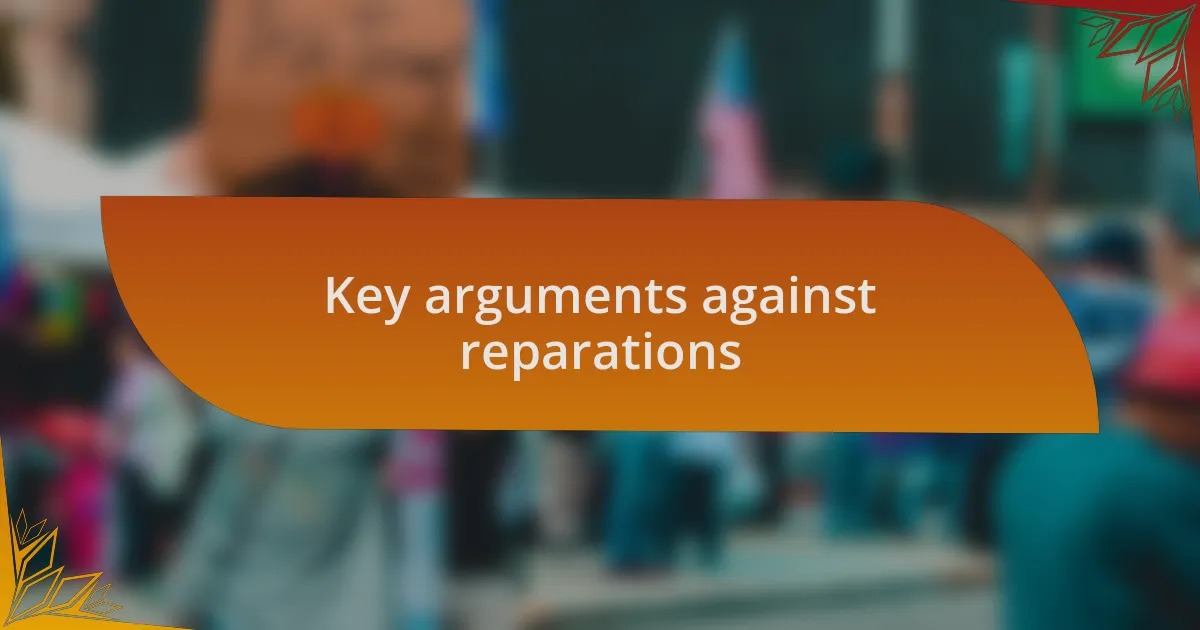
Key arguments against reparations
One prevailing argument against reparations focuses on personal responsibility. I’ve often heard the sentiment that individuals today should not be held accountable for the actions of their ancestors. It raises a thought-provoking question: how fair is it to tax one generation for the sins of another? I can’t help but ponder whether addressing historical injustices directly can distract us from the pressing issues facing our society today.
Another point often brought up is practical feasibility. As I engage with this topic, I realize that implementing a reparations program poses significant logistical challenges. Who would qualify for reparations, and how would we determine the amount? The complexities can feel overwhelming. It makes me think back to a discussion I had with a colleague; we both shared a sense of frustration over the bureaucratic hurdles that could hinder genuine help for those in need.
Some argue that reparations could lead to further division rather than healing. I’ll admit, when I first encountered this perspective, it resonated with me. The idea is that focusing on historical grievances can inadvertently fuel resentment between communities. Isn’t it worth asking whether pursuing reparations could alienate the very individuals we need as allies in fostering understanding and unity? Balancing acknowledgment of past wrongs with a forward-looking vision helps me consider the broader implications of this conversation.
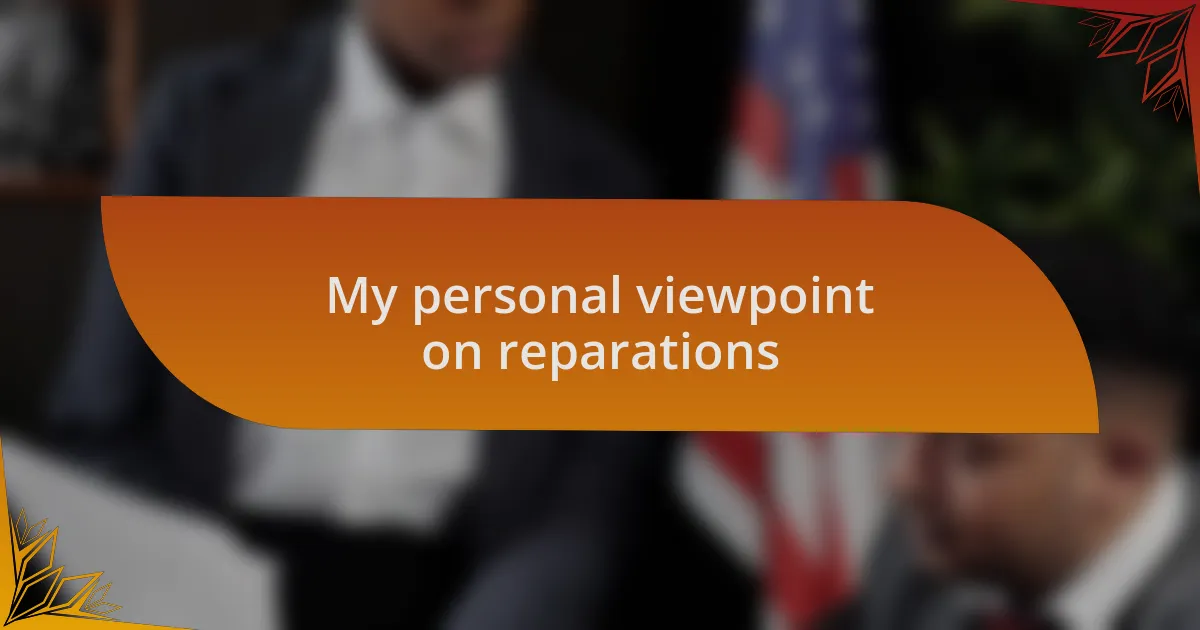
My personal viewpoint on reparations
My personal viewpoint on reparations is shaped by a blend of empathy and pragmatism. I vividly recall a conversation with a friend after visiting a museum exhibit on colonial history. We both felt a deep sense of sorrow for the injustices of the past, stirring an emotional desire for acknowledgment. However, I questioned whether financial reparations could truly encapsulate the pain and loss experienced by communities. Isn’t there a risk that monetary compensation might seem insufficient in the face of such historical trauma?
When I reflect on the potential for reparations in the UK, I can’t help but think about their impact on intergenerational relationships. Last summer, I attended a community meeting where diverse voices came together to discuss this topic. It struck me how shared experiences of injustice can unite us, yet I also sensed an underlying tension. Would reparations enhance solidarity, or could they deepen divides among us? It’s a delicate balance, relying on open dialogue and genuine understanding.
Ultimately, I believe that acknowledging the past is essential, but I wonder if the focus on financial reparations might overshadow other vital steps towards equality and justice. My experiences reinforce this notion; there have been moments when community-led initiatives created meaningful change without financial compensation. Could it be that reparative actions based on empathy and collaboration hold a greater promise for us all?
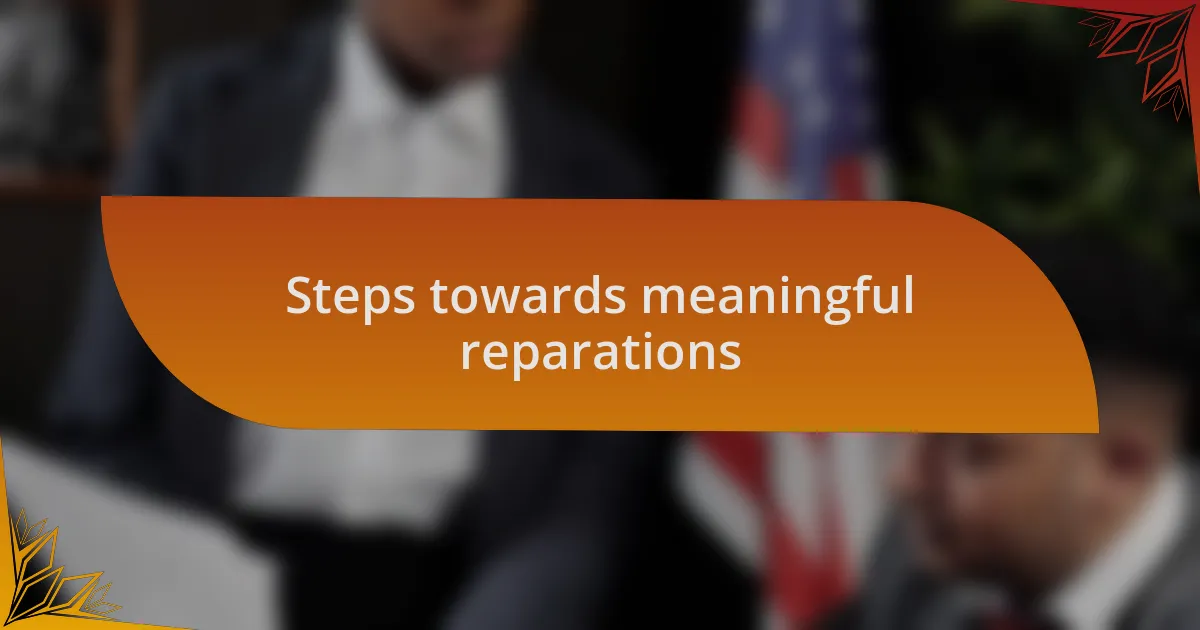
Steps towards meaningful reparations
One crucial step towards meaningful reparations involves fostering comprehensive dialogue across communities. I remember a workshop I attended where individuals from different backgrounds came together to share their stories. It was eye-opening to hear firsthand accounts of how colonial history shaped lives. These conversations not only built empathy but also sparked ideas for reparative measures that truly resonate with those affected. How often do we create platforms for such unfiltered discussions?
In addition to dialogue, education plays a pivotal role in the reparations journey. During a recent seminar on racial justice, participants emphasized the need for schools to incorporate robust curricula on colonial history and its impacts. I felt a sense of urgency hearing educators express their commitment to this cause. Shouldn’t future generations have a clear understanding of these historical injustices to foster a more equitable society?
Lastly, I believe that reparative initiatives should prioritize community empowerment. A friend of mine launched a local program aimed at supporting Black-owned businesses, which not only stimulates the economy but also celebrates cultural heritage. This approach resonates with me because it shifts the narrative from mere financial compensation to investing in the resilience and creativity of marginalized communities. Could empowerment be the true essence of reparative justice?